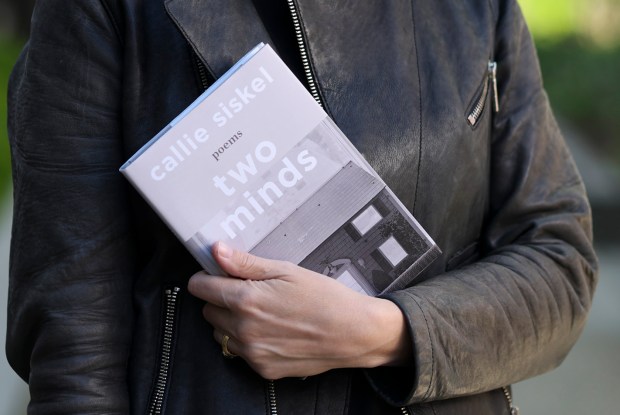The first time I met her she was tiny and her dad was tall. I bumped into them as they were walking through Lincoln Park on their way, the father said, “to the zoo,” and the little girl smiled and said, “We go all the time.”
This was almost 30 years ago. That father was Gene Siskel, my colleague at the Tribune, and the daughter was Callie, the middle child of Gene and his wife Marlene’s three children. They all lived — the others being Kate, three years older, and Will, eight years younger — a short stroll from the zoo.
The next time I saw Callie was in 1999 at the funeral of her father, dead at only 53, and I could see her and her siblings and could hear them cry.
I saw her again Sunday, sat and talked about her life now and about her husband, Michael O’Neill Burns, a former professor, musician, writer and a host/producer of the intriguing Wisecrack, a YouTube channel and digital media company, and their 9-month-old daughter Faye.
Callie is a smart and delightful young woman and of course we talked about her father, specifically because her first book, “Two Minds,” is a collection of nearly 50 poems dedicated to her father and is a stunning and stirring piece of work.
I am not the only one to think so. The book jacket is peppered with such praiseful words as “beautiful and spare,” “deeply compelling, it is the wisest book I know about the ways grieving divides us from ourselves” and “these intimate poems achieve an enduring painterly resonance that is startling and lucid in language.”
Many of the poems have been in the works for a decade, reworked and revised, and some have been previously published in such publications as The Paris Review, The Atlantic and Ploughshares. Five years ago, she began to enter various poetry contests and then started the arduous, rejection letter-filled chore of approaching publishers until W.W. Norton & Company made the right choice and published the handsome hardcover, illustrated with a photo from the Art Institute.
She now lives in Los Angeles and works as the poetry editor of the Los Angeles Review of Books. “I love Los Angeles,” she says. “I feel a part of what is a really exciting literary community.”
She and her husband and daughter are back in Chicago along with her brother (Will lives in Atlanta where he works as a coordinator of major league operations for the Atlanta Braves), sister (Kate is a marketing and communications executive at Convergent Energy and Power in New York City), their mother, aunts and other family members.
Marlene is understandably proud of her grown children and tells me, “As early as fourth grade, Callie’s teacher, Harriett Cholden, told me ‘This young girl is going to be a writer.’”
Reminded of that, Callie laughed and then said, “I don’t know about that, but I do remember reciting a poem from memory in high school. It felt so empowering.”
She attended Francis Parker, the private school in Lincoln Park, as did her siblings. She graduated from Yale University, as did her sister and her father (brother Will attended Macalester College in Minnesota). She earned a doctorate in creative writing and literature from the University of Southern California and was also a Wallace Stegner Fellow at Stanford University. She wants to write more books and she also wants to teach.
“I haven’t lived here since I was 18,” she says of Chicago. “Coming back is very emotional for me. Fun too, but there are so many memories here and sometimes there is a deep sense of loss attached to them, so sometimes they are quite painful.”
But in a very real sense, this book is less elegy but rather a celebration of life, then and now. There is one wonderfully touching poem, “Transparent Man,” that speaks gently of her father’s passionate feelings about the film “Saturday Night Fever,” which compelled him to buy at auction the white suit worn by John Travolta’s Tony Manero character.
And so, there is this too, a poem titled “Mirror Image”
When he was alive, we rode the elevator.
I recall his reflection in the brass doors
More easily than his body next to mine
Absence is not absolute; it’s insidious.
It leaves us the mirror image. My face,
for example. My brother’s. His stance.
For those of you too young to remember or never knew, Gene Siskel was the movie critic for this newspaper and, with Roger Ebert of the Sun-Times, formed a television team that made them without argument the most famous and powerful movie critics in the country.
Callie is more than aware of that legacy but also says, “I do not remember him so much as a reviewer and I didn’t really read his reviews in the paper. But I do remember, I can see him, typing with his index fingers hitting the keys. And I can remember watching him on this little TV we used to have in the kitchen and I know I used to sometimes ask him to wear a specific tie on TV, kind of like a private connection to me.”
With “Two Minds” she is still connecting.
Callie Siskel will be in conversation with local poet Richie Hofmann at 7 p.m. Friday at The Book Cellar, 4736 N. Lincoln Ave.; bookcellarinc.com





